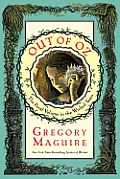Historicity as a Difference Between Baum’s Oz and Maguire’s Oz
 Last month I had the pleasure of hearing Gregory Maguire interviewed about Out of Oz and his entire Wicked Years series at the Cambridge Forum. There’s an edited recording of that conversation here at the Forum Network.
Last month I had the pleasure of hearing Gregory Maguire interviewed about Out of Oz and his entire Wicked Years series at the Cambridge Forum. There’s an edited recording of that conversation here at the Forum Network.
Among other things, Maguire described his childhood experience with L. Frank Baum’s Oz books. His local library had only the first two: The Wonderful Wizard of Oz and The Marvelous Land of Oz. He read in Edward Eager’s novels that there were more, but he never saw them. Maguire therefore went on to Narnia, Prydain, Earthsea, Middle Earth, and other fantasy worlds.
As an adult studying children’s literature, Maguire returned to the Baum novels he had missed. “When I finally got to Oz,” he said [according to the best notes I could take at the time], “I found they were a lot thinner than the first two. It doesn’t matter in which order you read them. L. Frank Baum had not been a historian after the first two books. The country did not change as time passed.”
There is a great deal of change in the government of Oz in those first two books. In the Emerald City, the Wizard is swiftly succeeded by the Scarecrow, General Jinjur, and Ozma. Outside, the Wicked Witches perish, and the Tin Woodman becomes emperor of the Winkies. That could leave an impressionable lad with the idea that the other books would also show such historical changes.
But once Ozma takes the throne of the Emerald City and soon all of Oz, every book’s plot is basically a restoration of that status quo, except a little bit better. Ozma’s occasionally kidnapped, confined, and in one book (The Wishing Horse of Oz) magically deposed, but she’s always back in power at the end.
Dorothy and her family, the Wizard, and Button-Bright from The Road to Oz eventually come to live in the Emerald City. But those are the only characters we meet in one Baum Oz book whose lives change significantly later.
Oz not only doesn’t change, but becomes less changeable. Baum established new facts to keep it that way: ageless immortality for all residents, a barrier cutting off the outside world, restrictions on who could practice magic.
For most Oz fans, that’s not a problem—it’s part of the series’ appeal. Oz will always be as you remember. Later books that made major changes in the Emerald City or Ozma’s realm have tended to be less popular. The favorites always return to the beloved status quo.
Maguire acknowledges that his version is different: “What I left out of Out of Oz was that ability of Oz to be permanent in the present.” But since much of his series was fueled by politics, that mutable quality was important to him: “Unless things can change in time, we have no need or reason to work for them to change.”
Of course, unless we can imagine an ideal, we don’t know what change to work for.


No comments:
Post a Comment